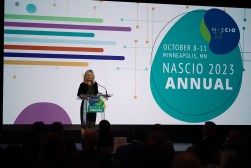5 key leadership lessons from NASCIO’s annual conference

The National Association of State Chief Information Officers annual conference in Nashville, Tennessee, included discussions around many of the organization’s usual topics, including customer relationship management tools, artificial intelligence and ransomware. But this year’s event also featured more conversations about leadership than in years past.
As the fields of technological inquiry that state CIOs are responsible for probing become more complex and fast-moving, officials attending the conference said it has become near-impossible for a single person to be an expert in all of these areas at once.
Instead, CIOs must trust their deputies to be the subject-matter experts, while they act as coordinators (or “brokers”) of these various concerns. Of the leadership lessons imparted at the conference, this one was perhaps the most common: Sometimes the best leaders, CIOs said, lead by giving people what they need to do their jobs and then get out of the way.
At a breakout session on Monday, several of NASCIO’s corporate members shared how personal life experiences had informed their leadership philosophies, including that one.
Christopher Merdon, senior vice president of NTT Data Services’ public-sector business, shared his recent experience of surviving a week in the desert together with seven others who had signed up to test their mettle against the wild. Merdon was forced to overcome his fear of heights as he the group ascended steep rock faces in search of water, read contour maps they’d been given to navigate strange country and spoon with the other adventurers at night to avoid freezing.
“That’s not something you want to do with a bunch of guys, generally,” Merdon said.
As much as Merdon absolutely “hated” the experience at the time — recalling that he’d written in his journal the trip was “the stupidest thing I’ve ever done” — he said it also imbued him with a new sense of who he was, and found direct connections to his professional life as he cooperated with his team.
1. Don’t underestimate the power of your team
Merdon said that as they traversed the terrain, each member of the camping party was forced to overcome harrowing challenges, but that by working together they were able to accomplish much more than any one of them would have been able to do individually.
One participant was so thirsty, the rest of the team had to convince her not to drink the larva- and mosquito-infested water she’d found, Merdon said. By combining the various skills of the team’s members, they managed to find fire-making implements and build a bonfire to keep warm at night, though there was nothing to cook over it.
2. Compare down
No matter how bad things seem, Merdon said, it’s important to realize that things can always be made worse and that one’s decisions continue to matter. That truth highlights the importance of not making rash decisions or mistakes that could further imperil the mission, but can also buoy a team’s spirits against what may seem an impossible situation.
“No matter how bad your day is going, compare down,” he said. “Things could always be so much worse.”
3. You’re more capable than you think
But his biggest takeaway from the trip, Merdon said, was that he had more ability and perseverance than he’d realized and he believes others do, too.
“We are capable of doing so much more,” Merdon said.
4. Humility makes effective leaders
Jenny Li, the senior vice president of product strategy for Foxit Software, said that recognizing her own weaknesses and then pushing forward — humbly — despite them, has been an invaluable tool in her career. She said it’s allowed her to accomplish tasks and enter roles she originally thought weren’t accessible to her.
Li, who was born in China, earned a master’s degree in computer science from the University of California, Riverside, and a master’s in business administration from Santa Clara University about 20 years ago, but she said that her shaky English skills and unfamiliarity with U.S. culture presented barriers along the way.
“I had a high [Test of English as a Foreign Language] score, but it turned out a lot harder than I expected — the language barrier, the culture shock,” Li said. “I felt I was apologizing every day, all day long for not understanding what people were saying. The most difficult part is when someone tells a joke or makes sarcastic remarks and I didn’t get the joke.”
All of this combined to create feelings of isolation and depression, she said. But when she was offered the chance to serve as a teacher’s assistant for a 25-student chemistry lab at her university, she took it. Communication, a skill she had been struggling with, was essential in an environment with active chemical reactions and open flames. Student safety hinged on her leadership.
“That is a scary thought, but I took the job with the determination that I’m going to be responsible not only for the lab’s safety but also that everyone gets the best learning experience and learning result from my lab session,” she said.
5. Don’t give up
While Li’s teaching-assistant job proved as difficult as she expected, she said she stayed humble and asked the advanced students for help when she needed it and practiced her communications and other skills like mad.
“I practiced and practiced and practiced again,” she said.
Her practice paid off. By sticking with the challenge and relying on the help of others when she needed it, she’d earned a reputation at the university for her leadership style and was voted one of the best teacher’s assistants for those two quarters, she said.
“Don’t be afraid if you’re not the smartest, not the strongest, if you don’t have all the skills,” Li said. “Step up to the opportunity and be a humble and responsible leader.”





